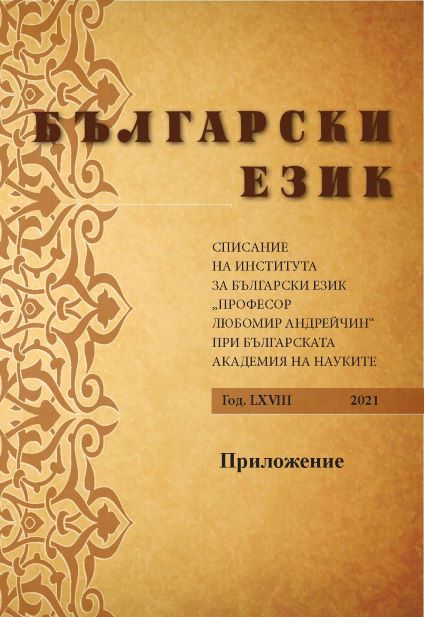ХАРАКТЕР И НЯКОИ РЕЗУЛТАТИ ОТ ВЗАИМОДЕЙСТВИЕТО НА ЛЕКСИКАЛНИТЕ И ГРАМАТИЧНИТЕ СИСТЕМИ НА ЕЗИЦИТЕ ОТ БАЛКАНСКИЯ ЕЗИКОВ СЪЮЗ С ОСМАНСКИ ТУРСКИ
CHARACTER AND SOME OUTCOMES OF THE INTERACTION OF LEXICAL AND GRAMMATICAL SYSTEMS OF THE LANGUAGES OF BALKAN SPRACHBUND WITH OTTOMAN TURKISH
Author(s): Maxim StamenovSubject(s): Language studies, Language and Literature Studies, Theoretical Linguistics, Applied Linguistics, Philology
Published by: Институт за български език „Проф. Любомир Андрейчин“, Българска академия на науките
Keywords: lexis; grammar; invariable words; sentence structure; utterance structure; language contacts; Balkan language union
Summary/Abstract: In this publication the potentialities are explored that some classes of loan words from Ottoman Turkish in Bulgarian and other Balkan languages may have influenced in a comparable way their turn toward analytism during the last 6 centuries. As a point of departure is taken the taxonomy of Turkish loans in the Bulgarian language presented some 100 years ago by Tsonev (1934). One of its specific features is the establishment as a separate group of the so-called by him „invariable words and exclamations“. Their peculiar nature is analyzed here along the lines of two hypotheses about the way of processing of linguistic information under the conditions of language contacts. First of them is about the so called „lexical diversity hypothesis“, proposed by Bentz et al. (2015) on typological grounds. The second one is about the „shallow pro¬cessing of information“ in a foreign language, developed on psycholinguistic grounds by Clahsen and Felser (2018). The way of functioning of invariable Turkisms – adjectives, adverbs, particles, conjunctions and interjections – is discussed in the light of these two hypotheses. As a result of the analysis we find that their regular inclusion in sentences and utterances lead to the optimization of certain ways of constructing sentence and utterance structure that lead to the compatible development of analytism in the Balkan languages. They found their way through the minimization of the lexical variation of the forms of the words that offered opportunities for them to be interpreted as different parts of speech and enter in different positions in the sentence structure. The “shallow processing of syntactic information”, as it developed during the centuries-long communication between speakers of Balkan languages, further optimized the opportunities in this respect, while the means of expression from Ottoman Turkish served the function of lingua franca without becoming a member of the Sprachbund in question.
Journal: Български език
- Issue Year: 67/2020
- Issue No: Special
- Page Range: 63-93
- Page Count: 31
- Language: Bulgarian

